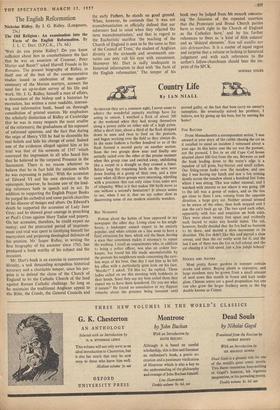The English Reformation
The Old Religion : An examination into the Facts of the English Reformation. By J. L. C. Dart. (S.P.C.K., 17s. 6d.) WHY do you praise Ridley? Do you know sufficient about him to counterbalance the fact that he was an associate of Cranmer, Peter Martyr and Bucer?' asked Hurrell Froude in his Remains. The present biography of Ridley, in itself one of the best of the commemorative studies issued in celebration of the quater- centenary of the Marian martyrs, answers the need for an up-to-date survey of his life and work. Mr. J. G. Ridley, himself a man of affairs, a descendant of the bishop and a historian by recreation, has written a most readable, interest- ing and informative book, based on thorough consultation of printed sources. He emphasises the scholarly distinction of Ridley at Cambridge (for he was in many respects the most erudite of the reformers), the gradualness of his espousal of reformed opinions, and the fact that during the reign of Henry VIII he had to dissemble his real beliefs and hide his change of mind. Indeed one of the evidences alleged against him at his trial was that of his sermons of 1547 'which conveyed the impression to all who heard him that he believed in the corporal Presence in the Sacrament. There is no reason whatever to believe that he in fact held the opinions which be was expressing in public.' With the accession of Edward VI and his own elevation to the episcopate, however, he became one of the lead- ing reformers both in speech and in act. In addition to supporting the English Prayer Books he purged Ms cathedral and some parish churches of his diocese of images and altars. On Edward's death he supported the accession of Lady Jane Grey; and he showed great courage in preaching at Paul's Cross against Mary Tudor and popery. On her accession, therefore, he could expect no mercy; and the protracted period of imprison- ment and trial was spent in fortifying himself for martyrdom and preparing theological defences of his position. Mr. Jasper Ridley, in writing the first biography of his ancestor since 1763, has produced a book worthy of his subject and the occasion.
Mr. Dart's book is an exercise in controversial divinity, a task demanding scrupulous historical accuracy and a charitable temper, since his pur- pose is to defend the claim of the Church of England to be the Catholic Church of the land against Roman Catholic challenge. So long as be maintains the traditional Anglican appeal to the Bible, the Creeds, the General Councils and
the early Fathers, he stands on good ground. When, however, he contends that 'it was not transubstantiation as officially defined that our reformers had in mind when they re,ected the term transubstantiation,' and that in regard to the Eucharistic sacrifice 'the teaching of the Church of England is seen to be the same as that of the Council of Trent,' the student of Anglican divinity in the sixteenth and seventeenth cen- turies can only rub his eyes with amazement. Moreover Mr. Dart is sadly inadequate in historical information to deal with 'the facts of the English reformation.' The temper of his book may be judged from his remark concern- ing 'the falseness of the repeated assertion that the Protestant and Broad Church parties have as much right in the Church of England as the Catholics have,' and by his further references to them as 'a kind of fifth column' and as 'disloyal elements.' Non tali auxilio nec istis defensoribus. It is a matter of equal regret and surprise that a volume so lacking in historical judgement and with such references to the author's fellow-churchmen should bear the im- print of the SPCK.
NORMAN SYKES


































 Previous page
Previous page